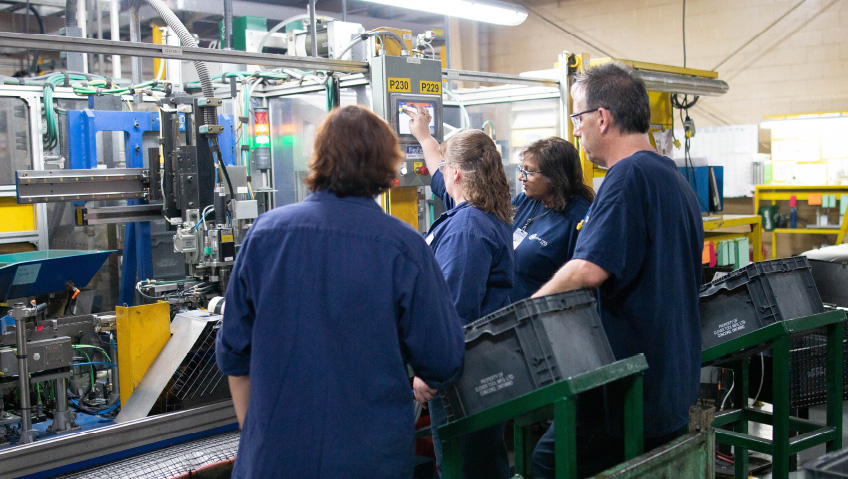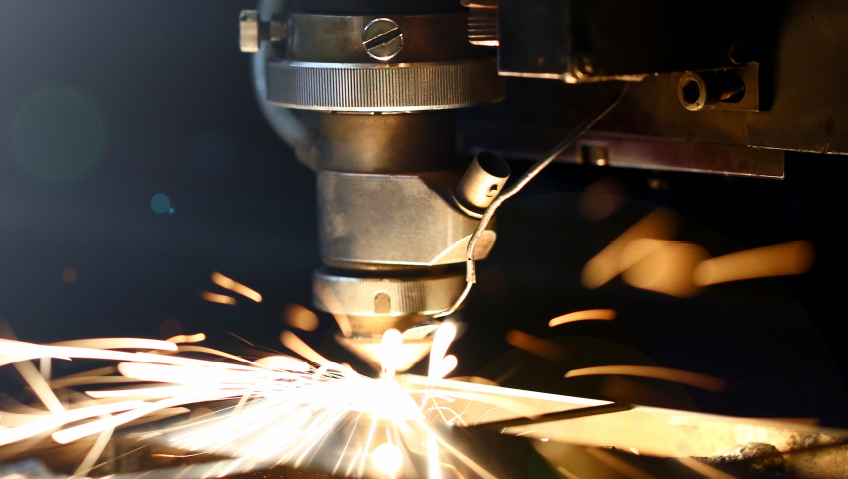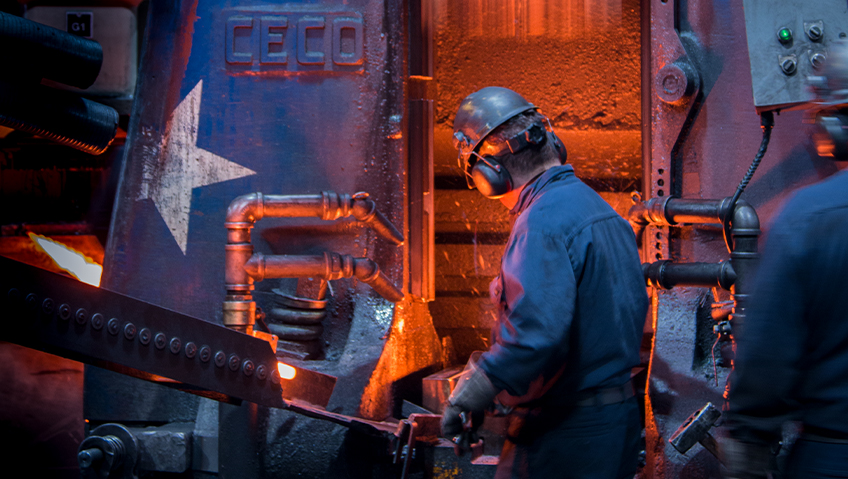Since its founding in 1979 as a tool and die company housed in a 2,000-square-foot shop with 10 employees, Clover Tool Manufacturing has expanded steadily, becoming a producer of completed and semi-finished components and moving to a 14,000-square-foot facility employing 30 people in Vaughan, Ontario in 1989.
Supplying both the automotive and general industries with tooling, welding, and mechanical assemblies, this privately owned Canadian company continues to flourish, expanding the stamping operation in 1993, and continues to operate out of a new 175,000-square-foot facility.
“Tooling has been our focal point of strength for years and years, because we began as a tooling shop started by our father,” explains General Manager Robert Zeni. “We have the experience, the dedication, and the individuals who can take difficult concepts and make what our customers need in a way that’s cost-effective, efficient, and imaginative.”
Utilizing the newest 3D CAD/CAM technology in tool design also enables Clover Tool to share files with clients and accelerate product development with its complete prototype service.
A young core
Clover Tool has also always had a strong apprenticeship program, which means that in a field with a shortage of toolmakers, the company boasts a young core of toolmakers who have grown with the company’s standard and its way of doing things and are now in leadership positions, continuing to push forward in the field of automotive tooling. While the tooling area at large has a deficit of skilled workers, Clover Tool was wide awake and saw the writing on the wall in time, managing to keep ahead.
“In the last five to six years, we’ve excelled,” Robert says. “We’ve always done stamping, but now we’re really making it cost-effective and leveraging our efficiencies, quality, and safety. We’re looking at some above-average numbers, and we’re pushing to get to world-class OEE.”
Clover Tool has also excelled in the assembly department in the last several years, developing strong systems and pushing the outer limits in quality and product realization to customers.
Millwrights wanted
“The maintenance areas are where we’re facing challenges, specifically with millwrights,” Robert says. “We have young electricians that we’ve grown, but with our millwrights, there’ve been few apprentices that we could develop.”
The advent of COVID also created some losses by way of retirement, he adds. “Otherwise, internally, we’ve always been able to train people, even coming off the street, and been able to develop and train individuals into different skill positions in the organization.”
In finding those individuals, Clover Tool has spread its net pretty wide, working with high schools, colleges, social media, and the penal system to locate and train workers, along with the immigration population.
“We’ve done a number of things to try and get people in because we understand that, first of all, our industry isn’t well-known,” says Robert, adding that the government’s putting an end to the funding of skilled trades in 2008 hasn’t helped either. To combat this, the company has worked with several local organizations in Vaughan, such as area businesses and the Chamber of Commerce, to lobby for students.
“It’s not [seen as] a glamorous industry that people want to go into,” says Vice President George Zeni. “It starts right from elementary school; as parents, we all want our kids to do better than we have, and they all want to become doctors, lawyers, and accountants, but not go into the skilled trades.”
Clover Tool is striving to make a difference, however, leveraging its impressive decades of experience, knowledge, and growth within a company performing quality work in a facility where it can build and maintain tools and continuously evolve and adapt.
“We’ve also expanded over the years into the production side of things, which is metal stamping, growing that to 20-plus presses under one roof,” says Robert. “And inevitably we went into the value-add—the robotics and robotic welding, robotic assembly, and spot welding—where we really focused on the automation side of things.”
Understanding that there always challenges that come with labour, Clover Tool has automated more and more, creating a new set of employment opportunities for programming and for maintaining these robots. The company also established a second location in Breslau, Ontario, adding a business called Ultramet industries Inc. to its family of companies.
The big one
In terms of upcoming projects, Clover Tool has been awarded a “big” contract with several customers, involving the largest investment the company has ever made in new stamping equipment: a 1,650-ton press which is double the size of the previous largest.
“We’re hoping to have that all operational by the end of the year, which will increase employment, increase sales, and hopefully attract a diversified new group of customers,” says Robert. “It puts us on a new level of stamping that not too many players are on at this moment.” He adds that in this industry, especially in Ontario, there are only a handful of companies that have this type of equipment.
“It’s challenging because it’s a lot of money and a lot of moving parts. There’s not only the equipment, but there are also the facilities that have to be modified so they can accept this piece of equipment—or pieces, actually. It’s a combination of equipment from different companies that you put together along with the auxiliary equipment to support the expansion.”
While Clover Tool could have purchased the equipment overseas to save money, the company stayed local, buying from Ontario-based companies, a point of pride.
The company also prides itself on making its working environment and culture a top priority, with 80 percent of its staff having been employed there for three to four years minimum.
“We also have staff who have been with us for 30-plus years,” says George. “Employee engagement has always been something big. We’ve started to emphasize that in terms of policies and procedures and always being an employee-first organization, because we couldn’t do any of the things we’ve been doing without our great employees.”
This has translated into loyalty “through thick and thin,” with employees always on board.
“Part of that is we have very welcoming accommodation policies,” says George. “We work with everybody. If anybody talks to us about changing a shift or working hybrid hours or working from home, well, we’ve been doing that since well before 2019.” Clover Tool has always accommodated its employees as much as possible, he adds, even in a manufacturing industry where workers are required to be on site to run machines.
A family approach
“We’ve always brought our people together to work together, and to make sure that people’s families are taken care of first,” George says. “That’s very important too, especially coming from a family organization. We know the importance of trying to keep everything going well.”
This includes limiting overtime, not only because it saves costs but to ensure people are well-rested and not burning out.
“We work five days a week and we don’t put in massive amounts of overtime as a lot of people do in manufacturing,” he adds. “We always try to balance our staff and ensure we don’t rely on temps. We have maybe a maximum five to six temps at a time and typically, when we bring in temps, we’re doing temp to permanent.”
While in some manufacturing organizations 40 percent of the staff is temporary labour, Clover Tool always avoided this practice. And when COVID hit, the company once again rose to a very challenging occasion.
“There has never been a shutdown of that magnitude in automotive,” says Robert. “It was surreal. In the beginning, we were able to keep as many people as we could pay to try to keep people with food on the table.”
The company also strove to keep its employees as safe as possible. “We never had a work spread, or work case of COVID, where it spread internally, which we’re proud of,” says Robert. “From the beginning, we had all the countermeasures in place, from electronic screening to temperature checks, and everybody came on board. I’m so proud of everybody. They really tried their hardest to keep everybody else safe.”
That sense of camaraderie has extended to other areas as well. “That engagement and fulfillment has helped bring those results to our customers, and we also enjoy a lot of social events,” George says. This includes a recent outreach program with Toronto Conservation, cleaning up a park; potlucks, barbecues, and picnics; and charitable work for Sick Kids Hospital and Cortellucci Vaughan Hospital.
Staying safe, staying desirable
In terms of wages, while Clover Tool can’t necessarily out-compete everyone else with dollars and cents, it can compete very well with its company culture as well as its “next level” quality standard, especially in a stamping environment, says Robert. The company’s customer rejections have been well below industry levels—“pretty much near perfect” for a stamping environment.
“In terms of safety we’ve also definitely been well above the standard,” says George. “Our WSIB rates are lower than the industry standard; currently we are 1400 days without a lost time accident.”
He adds that in the past 15-plus years, with regard to safety, Clover Tool has enjoyed very good standing in terms of few or no incidents at work, creating a work environment that both attracts workers and keeps them safe.
“We go above and beyond with our employees, so much so that we’ve had employees leave and within two weeks call and ask to come back,” says George. “We’ve succeeded in creating an environment where people want to stay.”






